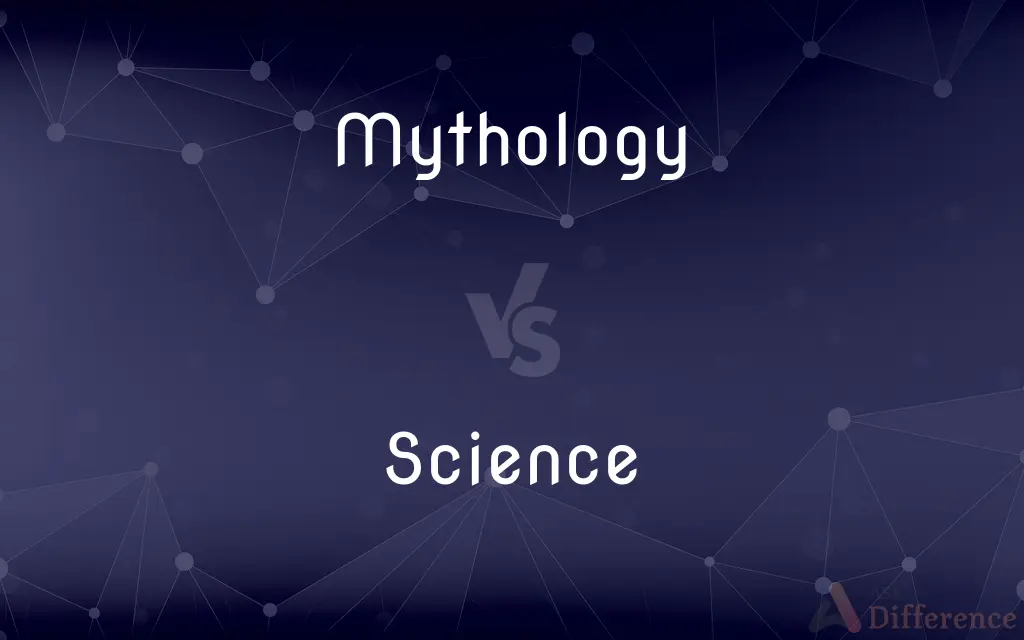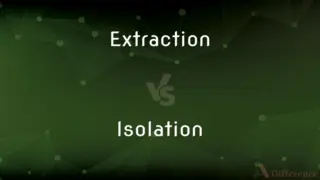Mythology vs. Science — What's the Difference?

Difference Between Mythology and Science
ADVERTISEMENT
Compare with Definitions
Mythology
A body or collection of myths belonging to a people and addressing their origin, history, deities, ancestors, and heroes.
Science
Science (from Latin scientia 'knowledge') is a systematic enterprise that builds and organizes knowledge in the form of testable explanations and predictions about the universe.The earliest roots of science can be traced to Ancient Egypt and Mesopotamia in around 3000 to 1200 BCE. Their contributions to mathematics, astronomy, and medicine entered and shaped Greek natural philosophy of classical antiquity, whereby formal attempts were made to provide explanations of events in the physical world based on natural causes. After the fall of the Western Roman Empire, knowledge of Greek conceptions of the world deteriorated in Western Europe during the early centuries (400 to 1000 CE) of the Middle Ages, but was preserved in the Muslim world during the Islamic Golden Age.
Mythology
A body of myths associated with an event, individual, or institution
"A new mythology, essential to the ... American funeral rite, has grown up" (Jessica Mitford).
Science
The observation, identification, description, experimental investigation, and theoretical explanation of phenomena
New advances in science and technology.
Mythology
The field of scholarship dealing with the systematic collection and study of myths.
ADVERTISEMENT
Science
Such activities restricted to a class of natural phenomena
The science of astronomy.
Mythology
The collection of myths of a people, concerning the origin of the people, history, deities, ancestors and heroes.
Science
A systematic method or body of knowledge in a given area
The science of marketing.
Mythology
A similar body of myths concerning an event, person or institution.
Science
(Archaic) Knowledge, especially that gained through experience.
Mythology
Pervasive elements of a fictional universe that resemble a mythological universe.
Science
(countable) A particular discipline or branch of learning, especially one dealing with measurable or systematic principles rather than intuition or natural ability.
Of course in my opinion Social Studies is more of a science than an art.
Mythology
(uncountable) The systematic collection and study of myths.
Science
Specifically the natural sciences.
My favorite subjects at school are science, mathematics, and history.
Mythology
The science which treats of myths; a treatise on myths.
Science
Knowledge gained through study or practice; mastery of a particular discipline or area.
Mythology
A body of myths; esp., the collective myths which describe the gods of a heathen people; as, the mythology of the Greeks.
Science
The fact of knowing something; knowledge or understanding of a truth.
Mythology
Myths collectively; the body of stories associated with a culture or institution or person
Science
(uncountable) The collective discipline of study or learning acquired through the scientific method; the sum of knowledge gained from such methods and discipline.
Mythology
The study of myths
Science
(uncountable) Knowledge derived from scientific disciplines, scientific method, or any systematic effort.
Science
The scientific community.
Science
Synonym of sweet science
Science
Obsolete spelling of scion
Science
To cause to become versed in science; to make skilled; to instruct.
Science
To use science to solve a problem.
Science
Knowledge; knowledge of principles and causes; ascertained truth of facts.
If we conceive God's sight or science, before the creation, to be extended to all and every part of the world, seeing everything as it is, . . . his science or sight from all eternity lays no necessity on anything to come to pass.
Shakespeare's deep and accurate science in mental philosophy.
Science
Accumulated and established knowledge, which has been systematized and formulated with reference to the discovery of general truths or the operation of general laws; knowledge classified and made available in work, life, or the search for truth; comprehensive, profound, or philosophical knowledge.
All this new science that men lere [teach].
Science is . . . a complement of cognitions, having, in point of form, the character of logical perfection, and in point of matter, the character of real truth.
Science
Especially, such knowledge when it relates to the physical world and its phenomena, the nature, constitution, and forces of matter, the qualities and functions of living tissues, etc.; - called also natural science, and physical science.
Voltaire hardly left a single corner of the field entirely unexplored in science, poetry, history, philosophy.
Science
Any branch or department of systematized knowledge considered as a distinct field of investigation or object of study; as, the science of astronomy, of chemistry, or of mind.
Good sense, which only is the gift of Heaven,And though no science, fairly worth the seven.
Science
Art, skill, or expertness, regarded as the result of knowledge of laws and principles.
His science, coolness, and great strength.
Science
To cause to become versed in science; to make skilled; to instruct.
Science
A particular branch of scientific knowledge;
The science of genetics
Science
Ability to produce solutions in some problem domain;
The skill of a well-trained boxer
The sweet science of pugilism
Share Your Discovery

Previous Comparison
Clinic vs. Hospital
Next Comparison
Extraction vs. Isolation













































